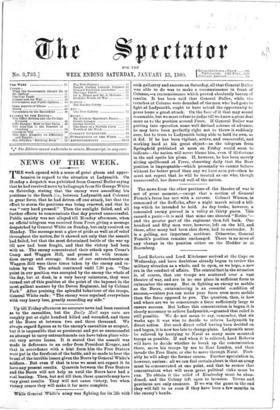NEWS OF THE WEEK.
THE week opened with a sense of great gloom and appre- hension in regard to the situation at Ladysmith. On Monday a despatch was published from General Buller saying that he had received news by heliograph from Sir George White on Saturday, stating that the enemy were assaulting his positions to the South (i.e., between Ladysmith and Colenso) in great force, that he had driven off one attack, but that the effort to storm the positions was being renewed, and that he was "very hard pressed." Then the sunlight failed, and all further efforts to communicate that day proved unsuccessful. Public anxiety was not allayed till Monday afternoon, when an official telegram was received from Frere giving a message despatched by General White on Sunday, but only received on Monday. The message sent a glow of pride as well as of relief throughout the nation, for it showed not only that the assault had failed, but that the most determined battle of the war up till now had been fought, and that the victory had been with us. The enemy concentrated their attack upon Cmsar's Camp and Waggon Hill, and pressed it with tremen- dous energy and courage. Some of our entrenchments on Waggon Hill were three times taken by the enemy and re- taken by us. The attack continued until 7.30 p.m. "One point in our position was occupied by the enemy the whole of the day, but at dusk, in a very heavy rainstorm, they were turned oat of this position at the point of the bayonet in the most gallant manner by the Devon Regiment, led by Colonel Park." After praising the splendid behaviour of the troops, General White ends : "The enemy were repulsed everywhere with very heavy loss, greatly exceeding my side."






































